外研版英语七年级上册 Module 6 A trip to the zoo Unit 1 Does it eat meat课件(共30张PPT)
文档属性
| 名称 | 外研版英语七年级上册 Module 6 A trip to the zoo Unit 1 Does it eat meat课件(共30张PPT) |
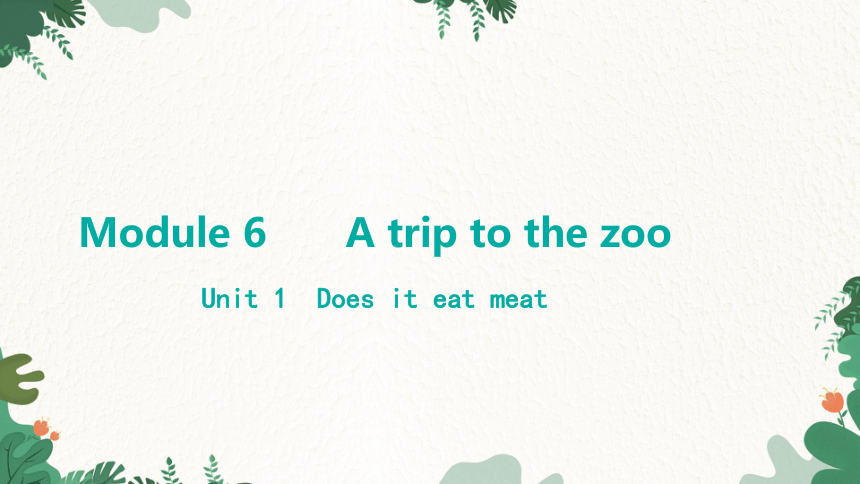
|
|
| 格式 | pptx | ||
| 文件大小 | 2.4MB | ||
| 资源类型 | 教案 | ||
| 版本资源 | 外研版 | ||
| 科目 | 英语 | ||
| 更新时间 | 2023-10-07 00:00:00 | ||
图片预览

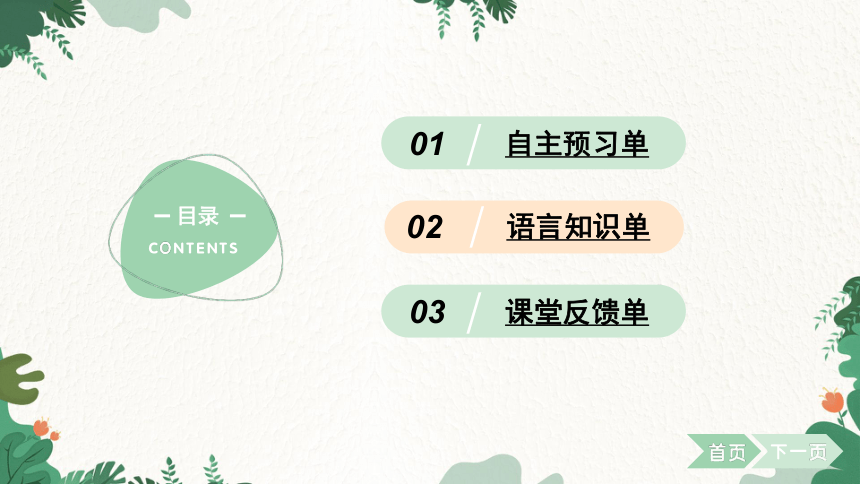
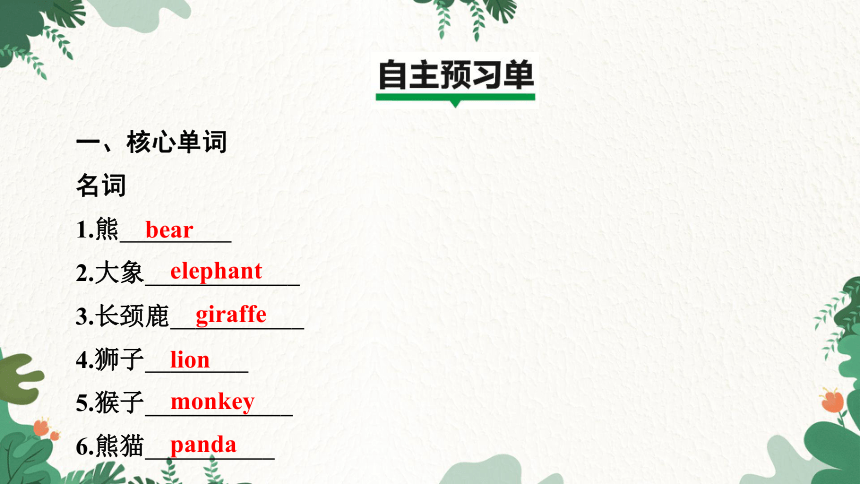
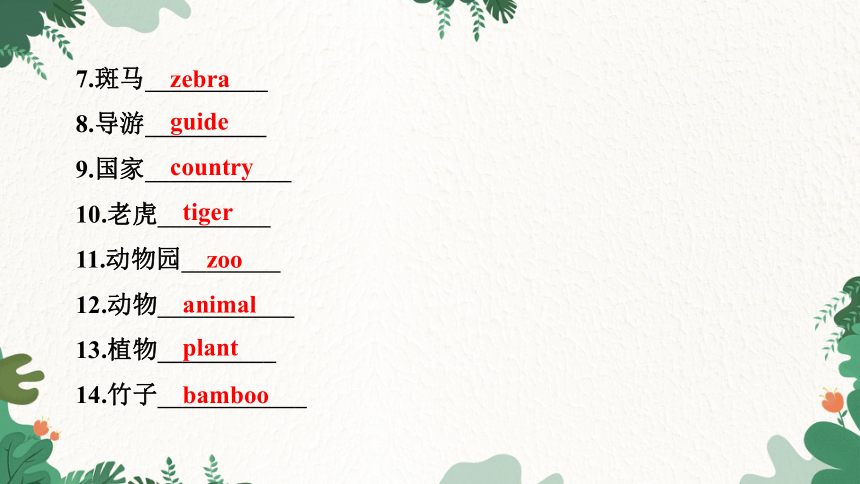
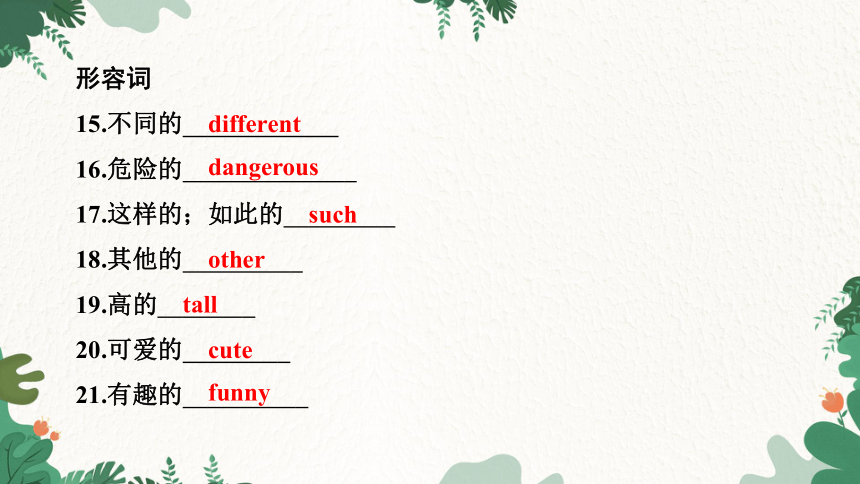

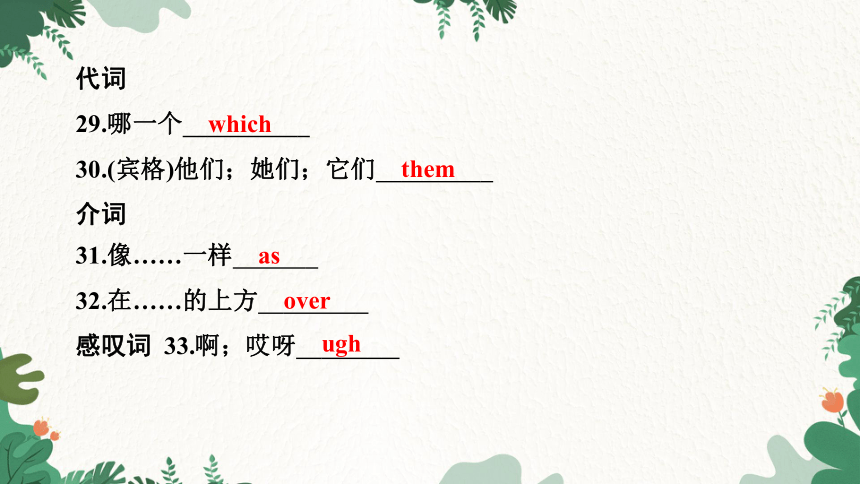
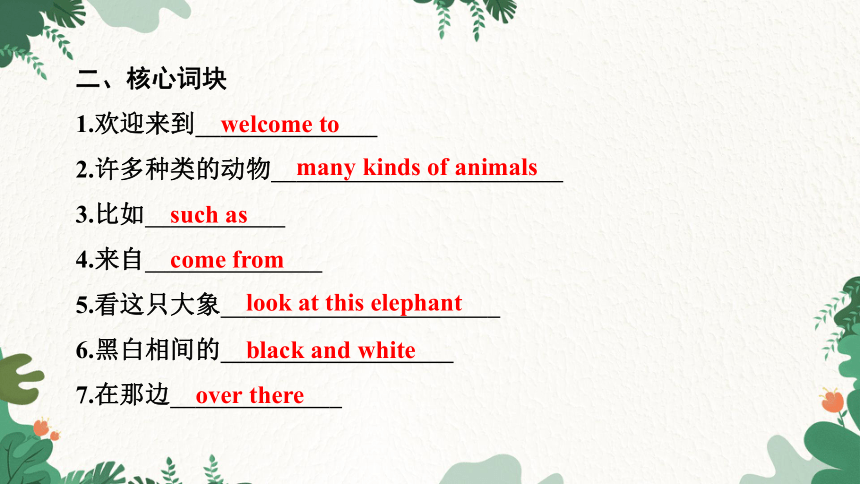
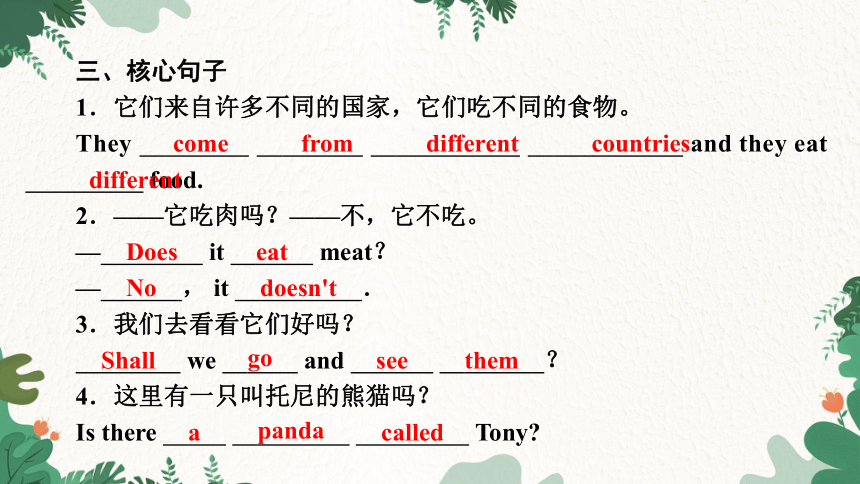
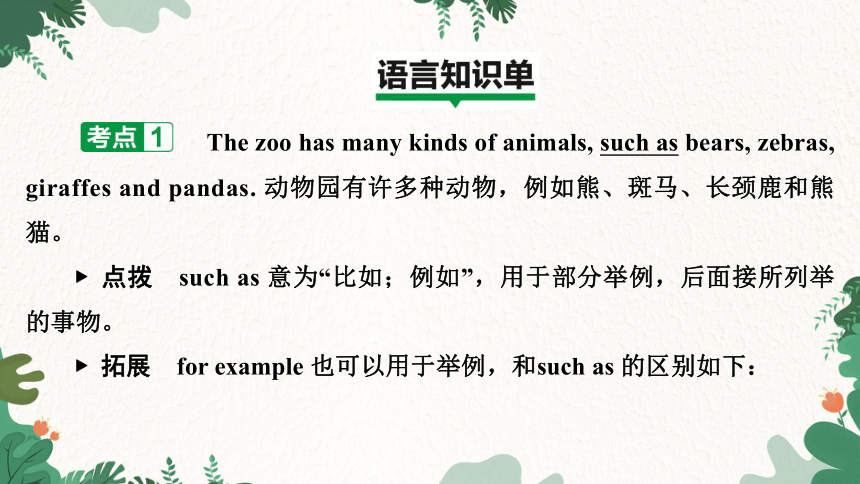
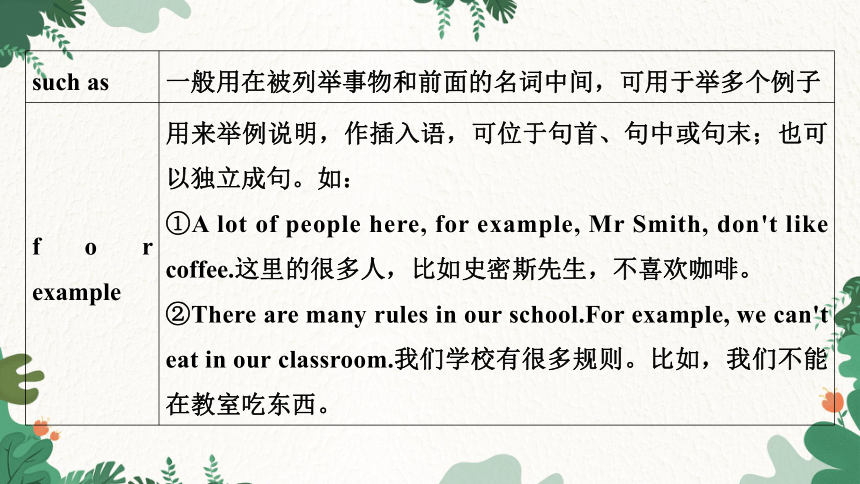
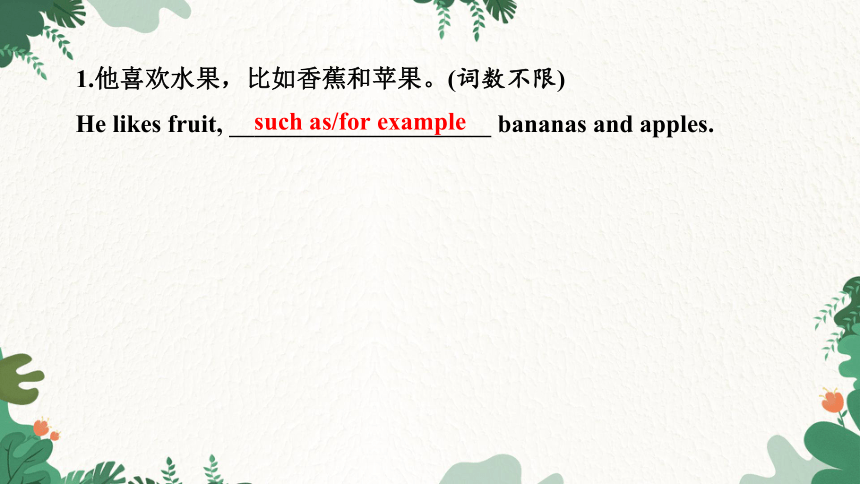
文档简介
(共30张PPT)
Module 6 A trip to the zoo
Unit 1 Does it eat meat
01
自主预习单
02
语言知识单
目录
03
课堂反馈单
目录
一、核心单词
名词
1.熊 bear
2.大象 elephant
3.长颈鹿 giraffe
4.狮子 lion
5.猴子 monkey
6.熊猫 panda
bear
elephant
giraffe
lion
monkey
panda
7.斑马 zebra
8.导游 guide
9.国家 country
10.老虎 tiger
11.动物园 zoo
12.动物 animal
13.植物 plant
14.竹子 bamboo
zebra
guide
country
tiger
zoo
animal
plant
bamboo
形容词
15.不同的 different
16.危险的 dangerous
17.这样的;如此的 such
18.其他的 other
19.高的 tall
20.可爱的 cute
21.有趣的 funny
different
dangerous
such
other
tall
cute
funny
副词 22.也;而且 also
23.当然 sure
24.在那边;往那里 there
动词 25.看;瞧 look
also
sure
there
look
26.把……叫做;称呼……为 call
27.来 come
28.……好吗?……要不要? shall
call
come
shall
代词
29.哪一个 which
30.(宾格)他们;她们;它们 them
介词
which
them
31.像……一样 as
32.在……的上方 over
感叹词 33.啊;哎呀 ugh
as
over
ugh
二、核心词块
1.欢迎来到 welcome to
2.许多种类的动物 many kinds of animals
3.比如 such as
4.来自 come from
5.看这只大象 look at this elephant
6.黑白相间的 black and white
7.在那边 over there
welcome to
many kinds of animals
such as
come from
look at this elephant
black and white
over there
三、核心句子
1.它们来自许多不同的国家,它们吃不同的食物。
They come from different countries and they eat different food.
2.——它吃肉吗?——不,它不吃。
— Does it eat meat?
— No , it doesn't .
3.我们去看看它们好吗?
Shall we go and see them ?
4.这里有一只叫托尼的熊猫吗?
Is there a panda called Tony
come
from
different
countries
different
Does
eat
No
doesn't
Shall
go
see
them
a
panda
called
The zoo has many kinds of animals, such as bears, zebras, giraffes and pandas. 动物园有许多种动物,例如熊、斑马、长颈鹿和熊猫。
点拨 such as 意为“比如;例如”,用于部分举例,后面接所列举的事物。
拓展 for example 也可以用于举例,和such as 的区别如下:
such as 一般用在被列举事物和前面的名词中间,可用于举多个例子
for example 用来举例说明,作插入语,可位于句首、句中或句末;也可以独立成句。如:
①A lot of people here, for example, Mr Smith, don't like coffee.这里的很多人,比如史密斯先生,不喜欢咖啡。
②There are many rules in our school.For example, we can't eat in our classroom.我们学校有很多规则。比如,我们不能在教室吃东西。
1.他喜欢水果,比如香蕉和苹果。(词数不限)
He likes fruit, such as/for example bananas and apples.
such as/for example
They come from many different countries and they eat different food.它们来自许多不同的国家,并且吃不同的食物。
点拨 (1)come from=be from 意为“来自”,后常接表示国家或地点名称的词。
(2)
( B )2.Tom from Foshan, Guangdong.
A.come B.comes C.are D.am
( C )3.This library is different that one.
A.in B.of C.from D.with
B
C
(1)Here are the lions.狮子在这儿。
(2)There she is! 她在那儿!
点拨 这两个句子是倒装句,正常语序分别是“The lions are here.”和“She is there.”。here和there位于句首,主语是名词时全部倒装,即“Here/There+动词+名词主语.”,主语是代词时部分倒装,即“Here/There+代词主语+动词.”。
( B )4.Here some photos for you to look at.
A.is B.are C.be D.am
( A )5.—Where is Jack
—Look!
A.There he is. B.There is he.
C.He there is. D.There Jack is.
B
A
They eat other animals.它们吃其他的动物。
点拨
6.珍妮不喜欢和其他人聊天。Jenny doesn't like to talk with other people .(词数不限)
( B )7.Catherine has two cousins.One is quiet, and is noisy(吵闹的).
A.another B.the other
C.other D.others
other
people
B
Look at this elephant.看这只大象。
点拨 look 作动词,意为“看;瞧”,后面不能直接跟宾语。look at 意为“看”,后接名词或代词作宾语。
拓展 辨析look at, see, watch与read
look at 强调看的动作 Please look at the blackboard.请看黑板。
see 强调看到的结果,指肉眼所能涉及的范围 I can see the monkey.我能看见这只猴子。
watch 强调长时间观看,如看电视、比赛等 Tom likes watching TV.汤姆喜欢看电视。
read 多指看或阅读某物,如读书、看报、看地图等 I like reading books.我喜欢看书。
8.看那只熊猫!
Look at that panda!(词数不限)
9.我可以看见树上有许多鸟。(翻译句子)
I can see many birds in the tree.
Look at
I can see many birds in the tree.
Shall we go and see them?我们去看看它们好吗?
点拨 Shall I/we do sth. 意为“我/我们做某事好吗?”,表示征求对方意见或提建议。肯定回答常用“Good idea./ Sure./ OK.”等;否定回答常用“I'm afraid… /I'd like to, but…”等。
( B )10.—Shall we go to visit our grandpa this afternoon
—
A.You're welcome. B.Good idea.
C.No, thanks. D.It doesn't matter.
11.今天下午我们去购物好吗?
Shall we go shopping this afternoon?(词数不限)
B
Shall we
Is there a panda called Tony…? 这里有一只叫托尼的熊猫吗……?
点拨 called意为“叫……的”,这里是过去分词作后置定语,相当于named。call作动词,意为“把……叫做;称呼为……”。
12.我有一个叫莉萨的笔友。
I have a penfriend called/named Lisa.
called/named
一、听Unit 1 Act.3对话,请根据括号内的提示,回答第1~3三个问题。
1.Which animals are dangerous?(Bears./Elephants./Lions.)
Lions.
2.Which animals eat meat?(Lions and elephants./Lions and bears./Elephants and bears.)
Lions and bears.
Lions.
Lions and bears.
3.What's the name of the panda in Beijing Zoo?(Lingling./Tony./Panpan.)
Lingling.
Lingling.
二、根据句意及音标提示填写单词。
1.He and I are from the same country /'k ntri/, China.
2.Our dog is really a clever animal /' n ml/.
3.Don't touch the fire! It's dangerous /'de nd r s/!
4. Which /w t / library do Lucy and Li Lei often go to
5.My brother is a tour guide /ga d/.He loves travelling.
country
animal
dangerous
Which
guide
三、课文回顾:根据Unit 1 Act.3对话,完成下面的短文填空,每空一词,每词仅用一次,有两词为多余项。
and they call come food animal meat
Lingling and Tony go to Beijing Zoo.Their guide tells them that there are many kinds of 1. animals ,such as bears, zebras, giraffes and pandas.These animals come from different countries and eat different 2. food .Lions eat meat and other animals.They are dangerous.Bears eat meat and plants.One of the elephants there is very tall.They don't eat 3. meat .They eat plants.Pandas are black 4. and white animals, and they love bamboo.They are Lingling's favourite animals.She thinks pandas are cute.Tony and Lingling go and see pandas.It is funny that there is a panda 5. called Lingling too.
animals
food
meat
and
called
and they call come food animal meat
谢谢大家!
Module 6 A trip to the zoo
Unit 1 Does it eat meat
01
自主预习单
02
语言知识单
目录
03
课堂反馈单
目录
一、核心单词
名词
1.熊 bear
2.大象 elephant
3.长颈鹿 giraffe
4.狮子 lion
5.猴子 monkey
6.熊猫 panda
bear
elephant
giraffe
lion
monkey
panda
7.斑马 zebra
8.导游 guide
9.国家 country
10.老虎 tiger
11.动物园 zoo
12.动物 animal
13.植物 plant
14.竹子 bamboo
zebra
guide
country
tiger
zoo
animal
plant
bamboo
形容词
15.不同的 different
16.危险的 dangerous
17.这样的;如此的 such
18.其他的 other
19.高的 tall
20.可爱的 cute
21.有趣的 funny
different
dangerous
such
other
tall
cute
funny
副词 22.也;而且 also
23.当然 sure
24.在那边;往那里 there
动词 25.看;瞧 look
also
sure
there
look
26.把……叫做;称呼……为 call
27.来 come
28.……好吗?……要不要? shall
call
come
shall
代词
29.哪一个 which
30.(宾格)他们;她们;它们 them
介词
which
them
31.像……一样 as
32.在……的上方 over
感叹词 33.啊;哎呀 ugh
as
over
ugh
二、核心词块
1.欢迎来到 welcome to
2.许多种类的动物 many kinds of animals
3.比如 such as
4.来自 come from
5.看这只大象 look at this elephant
6.黑白相间的 black and white
7.在那边 over there
welcome to
many kinds of animals
such as
come from
look at this elephant
black and white
over there
三、核心句子
1.它们来自许多不同的国家,它们吃不同的食物。
They come from different countries and they eat different food.
2.——它吃肉吗?——不,它不吃。
— Does it eat meat?
— No , it doesn't .
3.我们去看看它们好吗?
Shall we go and see them ?
4.这里有一只叫托尼的熊猫吗?
Is there a panda called Tony
come
from
different
countries
different
Does
eat
No
doesn't
Shall
go
see
them
a
panda
called
The zoo has many kinds of animals, such as bears, zebras, giraffes and pandas. 动物园有许多种动物,例如熊、斑马、长颈鹿和熊猫。
点拨 such as 意为“比如;例如”,用于部分举例,后面接所列举的事物。
拓展 for example 也可以用于举例,和such as 的区别如下:
such as 一般用在被列举事物和前面的名词中间,可用于举多个例子
for example 用来举例说明,作插入语,可位于句首、句中或句末;也可以独立成句。如:
①A lot of people here, for example, Mr Smith, don't like coffee.这里的很多人,比如史密斯先生,不喜欢咖啡。
②There are many rules in our school.For example, we can't eat in our classroom.我们学校有很多规则。比如,我们不能在教室吃东西。
1.他喜欢水果,比如香蕉和苹果。(词数不限)
He likes fruit, such as/for example bananas and apples.
such as/for example
They come from many different countries and they eat different food.它们来自许多不同的国家,并且吃不同的食物。
点拨 (1)come from=be from 意为“来自”,后常接表示国家或地点名称的词。
(2)
( B )2.Tom from Foshan, Guangdong.
A.come B.comes C.are D.am
( C )3.This library is different that one.
A.in B.of C.from D.with
B
C
(1)Here are the lions.狮子在这儿。
(2)There she is! 她在那儿!
点拨 这两个句子是倒装句,正常语序分别是“The lions are here.”和“She is there.”。here和there位于句首,主语是名词时全部倒装,即“Here/There+动词+名词主语.”,主语是代词时部分倒装,即“Here/There+代词主语+动词.”。
( B )4.Here some photos for you to look at.
A.is B.are C.be D.am
( A )5.—Where is Jack
—Look!
A.There he is. B.There is he.
C.He there is. D.There Jack is.
B
A
They eat other animals.它们吃其他的动物。
点拨
6.珍妮不喜欢和其他人聊天。Jenny doesn't like to talk with other people .(词数不限)
( B )7.Catherine has two cousins.One is quiet, and is noisy(吵闹的).
A.another B.the other
C.other D.others
other
people
B
Look at this elephant.看这只大象。
点拨 look 作动词,意为“看;瞧”,后面不能直接跟宾语。look at 意为“看”,后接名词或代词作宾语。
拓展 辨析look at, see, watch与read
look at 强调看的动作 Please look at the blackboard.请看黑板。
see 强调看到的结果,指肉眼所能涉及的范围 I can see the monkey.我能看见这只猴子。
watch 强调长时间观看,如看电视、比赛等 Tom likes watching TV.汤姆喜欢看电视。
read 多指看或阅读某物,如读书、看报、看地图等 I like reading books.我喜欢看书。
8.看那只熊猫!
Look at that panda!(词数不限)
9.我可以看见树上有许多鸟。(翻译句子)
I can see many birds in the tree.
Look at
I can see many birds in the tree.
Shall we go and see them?我们去看看它们好吗?
点拨 Shall I/we do sth. 意为“我/我们做某事好吗?”,表示征求对方意见或提建议。肯定回答常用“Good idea./ Sure./ OK.”等;否定回答常用“I'm afraid… /I'd like to, but…”等。
( B )10.—Shall we go to visit our grandpa this afternoon
—
A.You're welcome. B.Good idea.
C.No, thanks. D.It doesn't matter.
11.今天下午我们去购物好吗?
Shall we go shopping this afternoon?(词数不限)
B
Shall we
Is there a panda called Tony…? 这里有一只叫托尼的熊猫吗……?
点拨 called意为“叫……的”,这里是过去分词作后置定语,相当于named。call作动词,意为“把……叫做;称呼为……”。
12.我有一个叫莉萨的笔友。
I have a penfriend called/named Lisa.
called/named
一、听Unit 1 Act.3对话,请根据括号内的提示,回答第1~3三个问题。
1.Which animals are dangerous?(Bears./Elephants./Lions.)
Lions.
2.Which animals eat meat?(Lions and elephants./Lions and bears./Elephants and bears.)
Lions and bears.
Lions.
Lions and bears.
3.What's the name of the panda in Beijing Zoo?(Lingling./Tony./Panpan.)
Lingling.
Lingling.
二、根据句意及音标提示填写单词。
1.He and I are from the same country /'k ntri/, China.
2.Our dog is really a clever animal /' n ml/.
3.Don't touch the fire! It's dangerous /'de nd r s/!
4. Which /w t / library do Lucy and Li Lei often go to
5.My brother is a tour guide /ga d/.He loves travelling.
country
animal
dangerous
Which
guide
三、课文回顾:根据Unit 1 Act.3对话,完成下面的短文填空,每空一词,每词仅用一次,有两词为多余项。
and they call come food animal meat
Lingling and Tony go to Beijing Zoo.Their guide tells them that there are many kinds of 1. animals ,such as bears, zebras, giraffes and pandas.These animals come from different countries and eat different 2. food .Lions eat meat and other animals.They are dangerous.Bears eat meat and plants.One of the elephants there is very tall.They don't eat 3. meat .They eat plants.Pandas are black 4. and white animals, and they love bamboo.They are Lingling's favourite animals.She thinks pandas are cute.Tony and Lingling go and see pandas.It is funny that there is a panda 5. called Lingling too.
animals
food
meat
and
called
and they call come food animal meat
谢谢大家!
同课章节目录
- Starte
- Module 1 My teacher and my friends
- Module 2 My English lesson
- Module 3 My English book
- Module 4 My everyday life
- Module 1 My classmates
- Unit 1 Nice to meet you.
- Unit 2 I'm Wang Lingling and I'm thirteen years ol
- Unit 3 Language in use.
- Module 2 My family
- Unit 1 Is this your mum?
- Unit 2 These are my parents.
- Unit 3 Language in use.
- Module 3 My school
- Unit 1 There are thirty students in my class.
- Unit 2 The library is on the left of the playgroun
- Unit 3 Language in use.
- Module 4 Healthy food
- Unit 1 We've got lots of apples.
- Unit 2 Is your food and drink healthy?
- Unit 3 Language in use.
- Module 5 My school day
- Unit 1 I love history.
- Unit 2 We start work at nine o'clock.
- Unit 3 Language in use.
- Revision module A
- Module 6 A trip to the zoo
- Unit 1 Does it eat meat?
- Unit 2 The tiger lives in Asia.
- Unit 3 Language in use.
- Module 7 Computers
- Unit 1 How do I write my homework on the computer?
- Unit 2 When do you use a computer?
- Unit 3 Language in use.
- Module 8 Choosing presents
- Unit 1 I always like birthday parties.
- Unit 2 She often goes to concerts.
- Unit 3 Language in use.
- Module 9 People and places
- Unit 1 We're enjoying the school trip a lot.
- Unit 2 They're waiting for buses or trains.
- Unit 3 Language in use.
- Module 10 Spring Festival
- Unit 1 Are you getting ready for Spring Festival?
- Unit 2 My mother's cleaning our houses and sweepin
- Unit 3 Language in use.
- Revision module B
